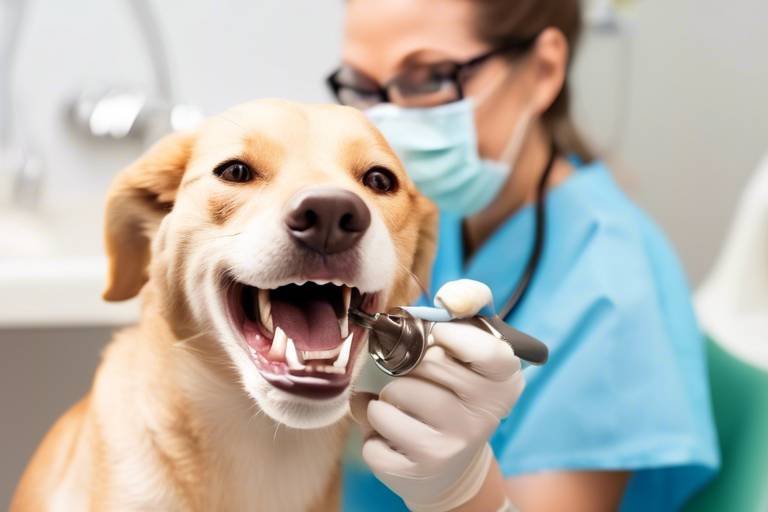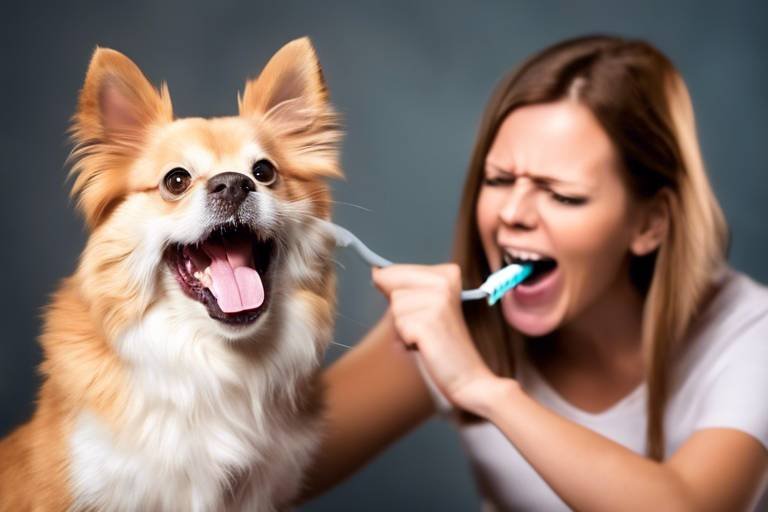Understanding Skin Problems in Pets and How to Treat Them
As pet owners, we often see our furry friends as family members, and just like any family member, their health is a top priority. One of the most common issues that pets face is skin problems, which can be both distressing for the pet and concerning for the owner. In this article, we will explore the various skin issues that pets can encounter, their causes, symptoms, and effective treatment options. By understanding these problems better, we can ensure our pets remain healthy and comfortable, allowing them to live their best lives.
Pets can suffer from a variety of skin problems that range from mild irritations to serious infections. Some of the most prevalent issues include allergies, infections, and infestations by parasites like fleas and ticks. Recognizing these problems early can make a significant difference in your pet's health and comfort. For instance, allergies may cause your pet to scratch incessantly, while infections can lead to painful lesions. The sooner you identify these issues, the quicker you can seek appropriate treatment.
Recognizing the signs of skin problems in pets is crucial for timely intervention. Common symptoms include:
- Itching and Scratching: Excessive scratching can indicate underlying skin issues.
- Redness and Inflammation: Look for areas of redness or swelling on the skin.
- Hair Loss: Patches of missing fur can signal serious problems.
- Odor: A foul smell may be a sign of infection.
By being vigilant and attentive to these symptoms, you can help your pet receive the care they need before the situation worsens.
Itching is often the first indicator of skin problems in pets. Imagine how frustrating it would be if you had an itch you couldn't scratch! When pets scratch excessively, it can lead to skin damage and even infections. Understanding the reasons behind this behavior is essential for diagnosing underlying issues effectively. Various factors can contribute to itching, including allergies, parasites, and infections.
Pets can suffer from three main types of allergies:
- Environmental Allergies: These are triggered by pollen, dust mites, and other environmental factors.
- Food Allergies: Certain ingredients in pet food can cause allergic reactions.
- Contact Allergies: These occur when a pet's skin comes into contact with irritants like certain fabrics or chemicals.
Identifying the specific type of allergy your pet has can help in finding effective treatment and relief.
Fleas and ticks are common parasites that can lead to severe skin irritation. These tiny pests can cause your pet to scratch and bite at their skin, leading to redness and inflammation. To prevent infestations, it's essential to maintain a regular flea and tick prevention regimen. If your pet does become infested, treatments are available that can help eliminate these pests and soothe irritated skin.
Bacterial and fungal infections can cause serious skin issues in pets. These infections often occur when the skin's protective barrier is compromised, allowing harmful microorganisms to invade. Symptoms may include redness, swelling, and discharge. Treatment options vary depending on the type of infection but may include topical or oral medications prescribed by a veterinarian.
While some skin issues require veterinary intervention, there are effective home remedies that can alleviate mild skin problems in pets. These natural alternatives can help soothe irritation and promote healing.
Several natural ingredients can provide relief for itchy skin. Options like oatmeal baths, aloe vera gel, and coconut oil can be soothing and safe for your pet. These remedies can be easily incorporated into your pet's care routine without the need for harsh chemicals.
Keeping your pet's skin hydrated is essential for overall skin health. Dry skin can lead to irritation and discomfort. Consider using natural moisturizing treatments, such as fish oil supplements or specialized pet moisturizers, to help maintain skin moisture and prevent dryness.
Knowing when to seek professional help is vital for your pet's health. If you notice any of the following signs, it's time to consult a veterinarian:
- Persistent itching that does not improve with home remedies.
- Severe redness or swelling that appears to worsen.
- Signs of infection, such as pus or a foul odor.
- Hair loss that is spreading or accompanied by other symptoms.
Your veterinarian can provide a thorough examination and recommend the best course of action to ensure your pet's skin health is restored.
Q: What are the most common skin problems in pets?
A: The most common skin problems in pets include allergies, infections, and infestations by fleas and ticks.
Q: How can I tell if my pet has a skin problem?
A: Look for signs such as itching, redness, hair loss, or unusual odors. If you notice any of these symptoms, it's best to consult your veterinarian.
Q: Are there natural remedies for pet skin issues?
A: Yes, natural remedies like oatmeal baths, aloe vera, and coconut oil can help soothe mild skin irritations. However, consult your vet before trying new treatments.
Q: When should I take my pet to the vet for skin problems?
A: If your pet shows persistent symptoms, severe irritation, or signs of infection, it's important to seek veterinary care as soon as possible.

Common Skin Problems in Pets
As pet owners, we cherish our furry companions and want them to lead happy, healthy lives. However, just like humans, pets can experience a variety of skin problems that can cause discomfort and distress. Understanding these common skin issues is the first step toward ensuring your pet's well-being.
Some of the most prevalent skin problems in pets include allergies, infections, and parasites. Each of these conditions can manifest in different ways, and recognizing the symptoms early can make all the difference in treatment and comfort. For instance, allergies can result from environmental factors like pollen or dust mites, while infections may arise from bacteria or fungi that thrive on the skin. On the other hand, parasites such as fleas and ticks can cause severe irritation and lead to more serious health issues if left untreated.
Let's dive deeper into these skin problems:
- Allergies: Pets can suffer from various types of allergies, including environmental, food, and contact allergies. These allergies often lead to excessive itching and scratching, which can further irritate the skin.
- Infections: Bacterial and fungal infections can occur when the skin's natural barrier is compromised. These infections can result in symptoms like redness, swelling, and even pus-filled lesions.
- Parasites: Fleas and ticks are notorious for causing skin problems. Not only do they bite and irritate the skin, but they can also transmit diseases that affect your pet's overall health.
Identifying these skin issues early can help in implementing effective treatment options. For example, if you notice your pet scratching excessively, it may be a sign of an allergic reaction or a flea infestation. Similarly, if you see any unusual redness or swelling on their skin, it could indicate an infection that needs prompt attention.
In addition to the physical symptoms, skin problems can also affect your pet's behavior. A pet that is uncomfortable due to skin irritation may become more irritable or withdrawn. Therefore, being vigilant and observant of any changes in your pet's skin or behavior is crucial. Regular grooming and skin checks can help you catch potential issues before they escalate.
In conclusion, by familiarizing yourself with these common skin problems, you can take proactive steps to keep your pet healthy and happy. Whether it’s adjusting their diet, maintaining a clean living environment, or seeking veterinary care when necessary, your efforts will significantly contribute to your pet's overall well-being.

Identifying Symptoms of Skin Issues
Recognizing the signs of skin problems in pets is crucial for timely intervention. Just like us, our furry friends can experience discomfort that manifests in various ways. If you notice your pet scratching, biting, or licking certain areas of their body excessively, it could be a telltale sign of an underlying skin issue. But how do you know when it's time to take action? Here are some common symptoms to watch for:
- Itching and Scratching: One of the most obvious signs is persistent itching. If your pet seems to be scratching more than usual, it could indicate allergies, infections, or even parasites.
- Redness and Inflammation: Look for areas of redness or swelling on your pet's skin. This could mean an allergic reaction or an infection that needs attention.
- Hair Loss: Patches of missing fur can be alarming. Hair loss can result from various issues, including hormonal imbalances, allergies, or fungal infections.
- Odor: A foul smell emanating from your pet's skin can signal a bacterial or fungal infection. It's essential to address this promptly.
- Scabs and Sores: The presence of scabs or open sores can indicate a more severe problem, such as a skin infection or a reaction to parasites.
Understanding these symptoms is the first step towards ensuring your pet's comfort and health. It's important to remember that while some issues can be treated at home, others may require professional intervention. For instance, if you notice your pet has developed a sudden case of itching accompanied by redness and hair loss, it’s wise to consult your veterinarian. They can provide a proper diagnosis and recommend the best course of action.
Additionally, keep in mind that some pets may show symptoms differently. For example, a dog may hide its discomfort, while a cat might become more aloof. Being observant and knowing your pet's normal behavior can help you catch these issues early. If you suspect a skin problem, consider keeping a journal of your pet's symptoms, noting when they occur and any changes in their environment or diet. This information can be invaluable to your vet.
Ultimately, the goal is to keep our beloved pets happy and healthy. By being vigilant and proactive about their skin health, you can help prevent minor issues from escalating into more serious conditions. Remember, your pet relies on you to recognize when something is off, so trust your instincts and don’t hesitate to seek help if needed.
Q: What should I do if I notice my pet scratching a lot?
A: If your pet is scratching excessively, check for fleas or ticks first. If you don't find any, monitor for other symptoms like redness or hair loss, and consult your veterinarian if the behavior persists.
Q: Can I use human shampoo on my pet for skin issues?
A: It's not advisable to use human shampoo on pets, as their skin has a different pH balance. Always opt for pet-specific products or consult your vet for recommended treatments.
Q: When should I take my pet to the vet for skin problems?
A: If your pet's symptoms last more than a few days, worsen, or are accompanied by other health issues, it's time to visit the vet. Prompt attention can prevent more serious complications.
Itching and Scratching
Itching and scratching are more than just annoying habits for our beloved pets; they can be clear indicators of underlying skin problems. Imagine how you feel when you have an itch that just won’t go away—it’s frustrating, distracting, and can lead to further issues if not addressed. For our furry friends, excessive scratching can lead to skin damage, infections, and a whole lot of discomfort. So, what causes this relentless scratching? Understanding the reasons behind it is crucial for diagnosing and treating the underlying issues effectively.
One of the most common culprits of itching in pets is allergies. Just like humans, pets can have allergic reactions to various substances, which can lead to intense itching. These allergies can stem from:
- Environmental Factors: Pollen, dust mites, and mold are just a few examples of allergens found in the environment.
- Food Sensitivities: Some pets may develop allergies to certain ingredients in their food, leading to skin irritations.
- Contact Allergies: Direct contact with certain materials, such as certain fabrics or chemicals, can trigger a reaction.
Another significant cause of itching is the presence of parasites, particularly fleas and ticks. These tiny intruders can cause not only irritation but also serious health problems if left untreated. Fleas, for example, can cause a condition known as flea allergy dermatitis, which leads to severe itching and scratching, ultimately resulting in skin infections. Ticks, on the other hand, can transmit diseases that can further complicate your pet’s health.
Moreover, skin infections—whether bacterial or fungal—can also lead to persistent itching. When the skin barrier is compromised, it becomes susceptible to infections that can cause inflammation and discomfort. If you notice your pet scratching excessively, it’s essential to observe their behavior closely. Are they scratching a specific area? Is there any redness, swelling, or hair loss? These signs can provide valuable clues to the underlying issue.
So, what can you do if your pet is constantly itching? First and foremost, it’s essential to consult with a veterinarian for a proper diagnosis. They may recommend allergy testing or skin scrapes to determine the root cause of the problem. In the meantime, keeping your pet’s skin clean and moisturized can help alleviate some discomfort. Regular grooming can also help remove allergens and parasites, providing some relief. Remember, addressing the cause of the itching is key to ensuring your pet remains happy and healthy!
- What are the most common causes of itching in pets? Allergies, parasites like fleas and ticks, and skin infections are the most common causes.
- How can I tell if my pet has a skin infection? Look for signs such as redness, swelling, discharge, or a foul odor from the affected area.
- When should I take my pet to the vet for itching? If your pet is scratching excessively, has visible skin damage, or if the itching persists despite home care, it's time to consult a vet.
Types of Allergies
When it comes to our beloved furry companions, allergies can be a significant source of discomfort and concern. Just like humans, pets can suffer from various types of allergies that can manifest in different ways. Understanding these allergies is crucial for pet owners to help alleviate their pet's suffering. There are three primary types of allergies that pets commonly experience: environmental allergies, food allergies, and contact allergies.
Environmental allergies are often triggered by substances in the pet's surroundings. Common culprits include pollen, dust mites, mold spores, and even certain grasses. These allergies can lead to symptoms such as persistent itching, sneezing, and watery eyes. Imagine your pet experiencing the same discomfort you feel during allergy season; it can be tough to watch them struggle. It's essential to identify these triggers, as they can vary greatly depending on the season and location.
Next, we have food allergies. These can be a bit trickier to pinpoint since they often require a process of elimination to identify the offending ingredient. Common allergens in pet foods include beef, chicken, dairy, wheat, and soy. If your pet is experiencing gastrointestinal issues, skin irritations, or excessive itching after eating, it might be time to consult with your veterinarian about potential food allergies. A change in diet can sometimes work wonders!
Lastly, contact allergies occur when a pet's skin reacts to something it comes into direct contact with. This could be anything from certain fabrics, shampoos, or even plants. For instance, if your pet has a reaction after rolling in the grass or wearing a new collar, it might be a contact allergy. Symptoms can include localized redness, swelling, and itching in the affected area. To help minimize these reactions, it’s important to monitor your pet's environment and grooming products closely.
In summary, being aware of these different types of allergies is essential for any pet owner. By recognizing the signs and symptoms early on, you can take proactive steps to help your furry friend find relief. If you're unsure about your pet's allergies, don't hesitate to reach out to your veterinarian for guidance and support. After all, a happy pet means a happy home!
Flea and Tick Infestations
Fleas and ticks are not just pesky nuisances; they can cause serious skin problems and health issues for your beloved pets. These tiny parasites thrive in warm and humid environments, making your home and yard prime breeding grounds. Did you know that a single female flea can lay up to 50 eggs per day? This rapid reproduction means that a small problem can quickly escalate into a full-blown infestation!
Identifying a flea or tick infestation early is crucial for your pet's well-being. Common signs include excessive scratching, biting at the skin, and even hair loss in areas where these pests are most active. Ticks, on the other hand, can often be found attached to your pet's skin, especially around the ears, neck, and between the toes. If you notice your furry friend acting unusually restless or irritable, it might be time to investigate further.
To manage and prevent flea and tick infestations, it’s essential to adopt a comprehensive approach that includes both treatment and prevention strategies. Here are some effective methods:
- Regular Grooming: Brush your pet frequently to remove any fleas or ticks before they can settle in.
- Flea and Tick Preventatives: Use veterinarian-recommended topical treatments or oral medications to keep these pests at bay.
- Clean Your Home: Vacuum carpets, furniture, and pet bedding regularly. Wash your pet’s bedding in hot water to kill any lingering eggs or larvae.
- Yard Maintenance: Keep your yard tidy by mowing the lawn and trimming shrubs to reduce hiding spots for ticks.
For pets already suffering from an infestation, treatment options include topical treatments, oral medications, and even flea collars. It's essential to consult your veterinarian to determine the best course of action tailored to your pet’s specific needs. Additionally, if you find ticks on your pet, remove them carefully with tweezers, pulling straight out without twisting, and ensure you dispose of them properly to prevent further issues.
In conclusion, staying vigilant and proactive against fleas and ticks can make a significant difference in your pet's health and comfort. Remember, a little prevention goes a long way in keeping your furry friends happy and itch-free!
Q: How can I tell if my pet has fleas or ticks?
A: Look for signs such as excessive scratching, biting at the skin, or visible fleas/ticks on your pet. A flea comb can also help you spot fleas more easily.
Q: Are flea and tick treatments safe for my pet?
A: Most veterinarian-recommended treatments are safe when used as directed. However, always consult your vet before starting any new treatment to ensure it's appropriate for your pet.
Q: Can fleas and ticks affect humans?
A: Yes, fleas and ticks can bite humans and transmit diseases. It's essential to manage infestations promptly to protect both pets and people in the household.
Skin Infections in Pets
When it comes to our furry companions, skin infections can be a serious concern that every pet owner should be aware of. These infections can manifest in various forms, often causing discomfort and distress to our beloved pets. The two most common types of skin infections in pets are bacterial and fungal infections, each with its own set of causes, symptoms, and treatment options. Understanding these infections can help you keep your pet healthy and happy.
Bacterial infections are often caused by bacteria that are normally present on the skin but can become problematic when the skin's barrier is compromised. This can happen due to various reasons such as allergies, injuries, or even excessive moisture. Common symptoms of bacterial skin infections include redness, swelling, and the presence of pus or crusty lesions. If you notice your pet exhibiting these signs, it’s crucial to act quickly. A veterinarian may prescribe antibiotics to help clear the infection and soothe your pet's skin.
On the other hand, fungal infections, such as ringworm, are caused by fungi that thrive in warm and moist environments. These infections are often characterized by circular patches of hair loss with a scaly appearance, and they can be quite contagious, affecting not only pets but also humans. Treatment usually involves antifungal medications, which can be topical or oral, depending on the severity of the infection.
To help you better understand the differences between bacterial and fungal skin infections, here’s a quick comparison:
| Type of Infection | Causes | Symptoms | Treatment |
|---|---|---|---|
| Bacterial | Compromised skin barrier, allergies, injuries | Redness, swelling, pus, crusty lesions | Antibiotics (topical or oral) |
| Fungal | Fungi in warm, moist environments | Circular patches of hair loss, scaly skin | Antifungal medications (topical or oral) |
Prevention is always better than cure, so keeping your pet’s skin healthy is essential. Regular grooming can help remove dirt and debris, while a balanced diet rich in omega fatty acids can enhance skin health from the inside out. Additionally, maintaining a clean living environment and promptly addressing any skin irritations can significantly reduce the risk of infections.
In conclusion, being vigilant about your pet's skin health is crucial. If you suspect your pet has a skin infection, don’t hesitate to consult your veterinarian. Early detection and treatment can make all the difference in ensuring your furry friend remains comfortable and healthy.
- What are the signs of a skin infection in pets? Look for symptoms such as redness, swelling, hair loss, and unusual odors.
- Can I treat my pet’s skin infection at home? While some mild issues can be managed at home, it's best to consult a veterinarian for proper diagnosis and treatment.
- How can I prevent skin infections in my pet? Regular grooming, a healthy diet, and prompt treatment of skin irritations can help prevent infections.

Home Remedies for Skin Problems
When it comes to our furry friends, their comfort and health are always a top priority. Skin problems can be quite distressing for pets, and while some issues may require a vet's intervention, many mild conditions can be managed effectively at home. By exploring natural remedies, pet owners can provide soothing relief to their companions without relying solely on commercial treatments. Let's dive into some effective home remedies that can help alleviate skin issues and keep your pet feeling their best.
One of the most common issues pets face is itchy skin. This can be caused by a variety of factors, including allergies, dry skin, or irritants. Fortunately, there are several natural anti-itch solutions that can help. For instance, oatmeal baths are not just for humans! They can work wonders for your pet's itchy skin. Simply grind plain oatmeal into a fine powder and add it to warm bath water. Allow your pet to soak for about 15-20 minutes. The oatmeal will help to soothe and moisturize the skin, providing much-needed relief.
Another fantastic home remedy involves using coconut oil. This magical oil is not only great for cooking but can also be applied topically to your pet's skin. Its natural anti-inflammatory and antibacterial properties can help reduce redness and irritation. Just take a small amount of coconut oil, warm it in your hands, and gently massage it into the affected areas of your pet's skin. Not only will it help with dryness, but it will also leave their coat shiny and healthy!
Additionally, keeping your pet's skin hydrated is essential for overall skin health. You can achieve this through various moisturizing treatments. For example, aloe vera gel is a wonderful natural moisturizer that can be applied directly to your pet's skin. It’s known for its healing properties and can help soothe sunburns, cuts, and abrasions. Just make sure to use pure aloe vera without any additives to ensure it's safe for your pet.
When using home remedies, it’s crucial to monitor your pet closely. If you notice any worsening of symptoms or if the condition doesn’t improve after a few days, it’s essential to consult a veterinarian. Remember, while home remedies can provide relief, they are not a substitute for professional care in more severe cases.
In conclusion, home remedies can be a great first line of defense against mild skin problems in pets. By utilizing natural ingredients like oatmeal, coconut oil, and aloe vera, you can help soothe your pet's skin and keep them comfortable. Always observe your pet's reactions to these treatments and don’t hesitate to seek veterinary advice when necessary. After all, a happy pet leads to a happy owner!
- What are the common signs of skin problems in pets?
Common signs include itching, redness, hair loss, and excessive scratching. If you notice these symptoms, it’s important to investigate further. - Can I use human products on my pet's skin?
It's best to avoid using human products unless they are specifically formulated for pets, as some ingredients can be harmful to them. - How often can I give my pet an oatmeal bath?
Oatmeal baths can be given as often as needed, especially during flare-ups of itchy skin, but a weekly bath is generally sufficient for maintenance. - When should I consult a veterinarian?
If your pet's condition worsens or does not improve after a few days of home treatment, it’s crucial to seek professional help.
Natural Anti-itch Solutions
When your furry friend is scratching and itching, it can be distressing for both of you. Luckily, there are several that can provide relief without resorting to harsh chemicals. One of the most popular remedies is oatmeal baths. Oatmeal is known for its soothing properties and can help calm irritated skin. Simply grind plain oatmeal into a fine powder and mix it with warm water to create a soothing bath for your pet. Let them soak for about 15-20 minutes, and you’ll notice a significant difference in their comfort level.
Another effective option is using coconut oil. This versatile oil not only moisturizes the skin but also has antibacterial and antifungal properties. Applying a small amount of organic coconut oil directly to the affected areas can help soothe itching and promote healing. Additionally, you can add it to your pet's diet for overall skin health. Just be sure to consult your veterinarian about the right amount.
For those pets who suffer from allergies, apple cider vinegar can be a game-changer. It acts as a natural antiseptic and can help balance the pH levels of your pet's skin. Mix equal parts of apple cider vinegar and water, and apply it to the itchy areas using a cotton ball. However, be cautious and avoid applying it to open wounds, as it may sting. You can also use it as a rinse after a bath to help with itchiness.
Another popular remedy is aloe vera, known for its soothing and healing properties. The gel from the aloe vera plant can be applied directly to the skin to reduce inflammation and provide cooling relief. It’s safe and gentle, making it a fantastic option for pets. Just ensure that your pet doesn’t lick it off immediately after application, as it may cause gastrointestinal upset.
Lastly, consider incorporating essential oils like lavender or chamomile into your pet care routine. These oils not only smell great but can also help soothe irritated skin. However, it's crucial to use only pet-safe essential oils and to dilute them properly before applying. Always consult your veterinarian to ensure that the oils are safe for your specific pet breed.
In summary, there are numerous natural remedies available to alleviate your pet's itching. Whether it’s a soothing oatmeal bath, the healing power of coconut oil, the antiseptic properties of apple cider vinegar, or the calming effects of aloe vera and essential oils, these options can help your furry friend find relief. Remember, however, that if your pet's condition does not improve or worsens, it's essential to consult your veterinarian for further advice.
- What are the signs that my pet has skin allergies? Look for symptoms like excessive scratching, redness, swelling, or hair loss.
- Are natural remedies safe for all pets? While many natural remedies are safe, it's important to consult your veterinarian to ensure they are suitable for your specific pet.
- How often can I use natural anti-itch treatments? It depends on the remedy; for example, oatmeal baths can be done weekly, while coconut oil can be applied as needed.
- When should I take my pet to the vet for skin issues? If your pet's symptoms persist for more than a few days or worsen, it's best to seek professional help.
Moisturizing Treatments
Keeping your pet's skin hydrated is not just a luxury; it’s a necessity! Just like humans, pets can suffer from dry skin, which can lead to discomfort and a host of other skin problems. Imagine a world where your furry friend is scratching incessantly, looking at you with those sad puppy eyes, begging for relief. That’s where moisturizing treatments come into play! These treatments can help restore moisture to your pet's skin, soothe irritation, and promote overall skin health.
One of the best ways to start is by incorporating natural oils into your pet's grooming routine. Oils such as coconut oil and olive oil are fantastic for moisturizing. Not only do they hydrate the skin, but they also have anti-inflammatory properties that can reduce redness and irritation. Just a small amount can go a long way; you can apply it directly to dry patches or mix it into their food for an internal boost.
Another effective option is to use moisturizing shampoos specifically designed for pets. These shampoos are formulated to clean without stripping the skin of its natural oils. Look for products that contain ingredients like aloe vera or oatmeal, which are known for their soothing properties. When bathing your pet, make sure to rinse thoroughly to avoid any residue that could lead to further irritation.
In addition to oils and shampoos, consider using leave-in conditioners or sprays that can provide ongoing moisture throughout the day. These products are especially useful during the colder months when the air is drier. A simple spritz can make a world of difference, keeping your pet's skin soft and supple. Always check the ingredient list to ensure that the product is free from harsh chemicals that could exacerbate skin issues.
For pets that are prone to severe dryness or have skin conditions, you might want to consult your veterinarian about medicated moisturizers. These can provide targeted relief and often contain ingredients that promote healing and skin barrier restoration. Remember, though, that not all pets will need the same treatment, so it’s essential to tailor the approach based on your pet's specific needs.
It’s also beneficial to maintain a balanced diet rich in fatty acids. Foods high in Omega-3 and Omega-6 fatty acids can significantly improve your pet's skin health from the inside out. You can find these in fish oil supplements or certain types of fish, which can be a delicious treat for your pet. Just like you wouldn’t ignore your own diet when it comes to skin health, the same goes for your furry companions!
In conclusion, moisturizing treatments are a vital part of maintaining your pet's skin health. With a combination of natural oils, specialized shampoos, leave-in conditioners, and a nutritious diet, you can keep your pet feeling comfortable and looking their best. Remember, a happy pet is a healthy pet!
- How often should I moisturize my pet's skin? It depends on your pet's skin condition, but generally, moisturizing once a week is a good start. Adjust based on your pet's needs.
- Are there any ingredients I should avoid? Yes! Avoid products with artificial fragrances, parabens, and sulfates, as they can irritate your pet's skin.
- Can I use human moisturizers on my pet? It's best to avoid using human products, as they may contain ingredients harmful to pets. Always opt for pet-specific products.
- What signs indicate that my pet needs moisturizing treatments? Look for signs like excessive scratching, redness, flaking skin, or bald patches. If you notice these, it’s time to moisturize!

When to Consult a Veterinarian
As a pet owner, one of the most challenging decisions you face is knowing when to seek professional help for your furry friend. While many skin issues can be managed at home, there are specific signs that indicate a trip to the veterinarian is necessary. Recognizing these signs early can make a significant difference in your pet's health and comfort.
First and foremost, if your pet is experiencing severe itching that leads to excessive scratching, biting, or licking, it's time to consult a vet. This behavior can not only cause further skin damage but also lead to secondary infections. If you notice any of the following symptoms alongside itching, don’t hesitate:
- Redness or swelling of the skin
- Open sores or lesions
- Hair loss in patches
- Foul odor emanating from the skin
Another critical indicator is the presence of skin infections. If your pet develops a rash or you observe any unusual discharge from their skin, these could be signs of bacterial or fungal infections that require immediate veterinary attention. Similarly, if your pet's skin condition worsens despite your efforts to treat it at home, it’s essential to consult a veterinarian. They can diagnose the underlying cause and provide appropriate treatment options that you may not have access to at home.
Additionally, if you suspect that your pet is suffering from a severe allergic reaction, characterized by swelling of the face or difficulty breathing, you should seek emergency veterinary care immediately. Allergies can escalate quickly and lead to life-threatening situations.
Lastly, if your pet is experiencing any changes in behavior, such as increased lethargy, loss of appetite, or unusual vocalizations, these could be signs of pain or discomfort associated with skin problems. Remember, pets often hide their pain, so any significant behavioral changes should be taken seriously. Observing these changes can provide valuable information to your veterinarian, ensuring your pet receives the best care possible.
In conclusion, while some skin issues can be managed at home with natural remedies and over-the-counter treatments, it's crucial to recognize when professional help is needed. Always trust your instincts as a pet owner; if something seems off, it’s better to be safe than sorry. Your pet relies on you for their health and happiness, so don’t hesitate to reach out to a veterinarian when in doubt.
- How do I know if my pet's skin issue is serious? Look for signs like severe itching, redness, swelling, or discharge. If these symptoms persist or worsen, consult a vet.
- Can I treat my pet's skin problems at home? Mild skin issues can often be treated at home with natural remedies, but always consult your vet for guidance, especially for severe cases.
- What should I do if my pet has a severe allergic reaction? Seek emergency veterinary care immediately if you notice swelling, difficulty breathing, or other severe symptoms.
Frequently Asked Questions
- What are the most common skin problems in pets?
Pets can experience a variety of skin issues, including allergies, infections, and infestations from parasites like fleas and ticks. Each of these problems can manifest in different ways, so it's essential for pet owners to be vigilant about their pet's skin health.
- How can I recognize if my pet has a skin problem?
Common symptoms of skin issues in pets include itching, redness, hair loss, and the presence of sores or rashes. If you notice your pet scratching excessively or if their skin looks irritated, it’s a good idea to consult a veterinarian for a proper diagnosis.
- What types of allergies can pets have?
Pets can suffer from several types of allergies, including environmental allergies (like pollen or dust mites), food allergies (certain proteins or grains), and contact allergies (reaction to substances like certain fabrics or chemicals). Understanding these can help you identify potential triggers for your pet.
- How do I prevent flea and tick infestations?
Preventing fleas and ticks involves regular use of preventive treatments such as topical solutions, collars, or oral medications. Keeping your pet’s environment clean and free of pests is also crucial, as is regular grooming to check for any signs of infestation.
- What are some home remedies for mild skin issues in pets?
There are several effective home remedies for mild skin problems, such as using oatmeal baths to soothe itching, applying aloe vera for its healing properties, or using coconut oil to moisturize dry skin. Always ensure that any remedy is safe for your specific pet before use.
- When should I take my pet to the veterinarian for skin problems?
If your pet shows signs of severe irritation, persistent itching, or if the skin condition worsens despite home treatment, it's time to consult a veterinarian. Additionally, if you notice any unusual lumps, sores that don't heal, or signs of infection (like pus or a bad odor), seek professional help immediately.



















